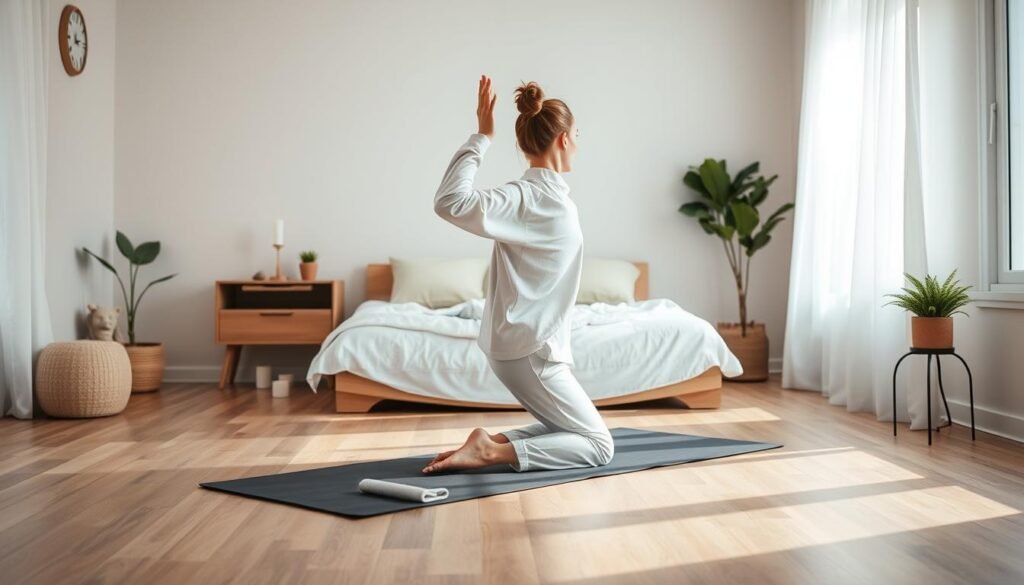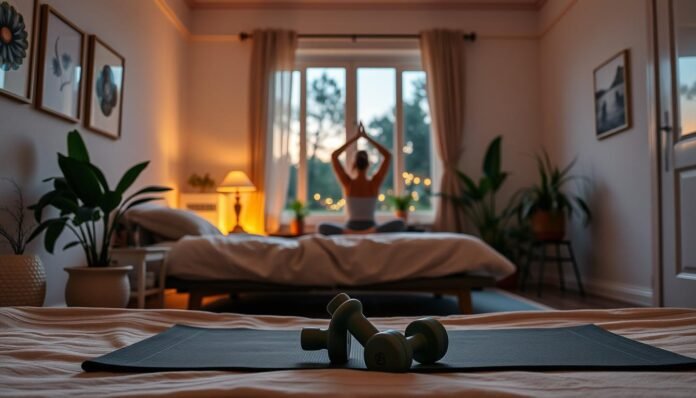Getting a good night’s sleep is key for health and happiness. Yet, many people have trouble sleeping. Almost a third of adults face chronic insomnia, making it hard to fall or stay asleep1. Luckily, exercise can help improve sleep quality and make falling asleep easier.
Moderate aerobic exercise, like brisk walking or cycling, boosts slow wave sleep. This is the deepest and most restorative sleep stage1. Exercise also helps calm the mind and reduce stress and anxiety, common sleep disruptors1. Studies show that exercise can lower stress, leading to better sleep2.
When you exercise might affect your sleep differently. Yet, even evening workouts can help if they’re not too intense or too close to bedtime2. Just 30 minutes of moderate exercise can improve sleep that night. Sticking to a regular sleep schedule helps keep your body’s natural rhythm.
Key Takeaways
- Exercise, especially moderate aerobic activities, can improve sleep quality and help you fall asleep faster.
- The timing of exercise may affect individuals differently, but even evening workouts can promote better sleep.
- Consistent sleep and wake times are important for maintaining the body’s natural circadian rhythm.
- Stress and anxiety can hinder sleep, but exercise can help reduce stress levels and improve sleep.
- Incorporating exercise into your routine can be a valuable strategy for getting a good night’s sleep.
Understanding the Sleep-Exercise Connection
The link between exercise and sleep is complex but interesting3. Studies show that 30 minutes of moderate exercise can improve sleep quality that night3. Some people need to exercise for 1 to 2 hours before bed to help their brain relax3.
Exercise can make your body temperature rise, making you feel awake3. But, as your temperature drops, you start to feel sleepy within 30 to 90 minutes after exercising3.
The Science Behind Exercise and Sleep Quality
How exercise affects sleep can differ from person to person3. You might see better sleep right away, not after months or years3. Aerobic exercise can increase slow wave sleep, which is deep sleep for your body and mind3.
Choosing an exercise you enjoy can help improve sleep3. This is because it engages your brain and body in a good way3.
How Physical Activity Affects Sleep Hormones
4 Exercise can be as good as sleep meds for chronic insomnia4. Just 30 minutes of movement a day can lead to better sleep4. Regular exercise can also make you fall asleep faster and sleep longer4.
Starting a workout routine can make you fall asleep 13 minutes faster and sleep 18 minutes longer in four weeks4. Tracking your workouts and sleep can show how exercise affects your sleep4.
The Role of Core Body Temperature
5 Over 2 million healthcare providers worldwide use UpToDate for better care decisions5. Issues like snoring, daytime tiredness, and waking up short of breath can harm sleep quality5. Eating well can lower the risk of heart disease, stroke, diabetes, and obesity5.
Some diets may also reduce depression and anxiety risk5. A healthy diet and exercise together offer more benefits than diet alone5. Avoiding caffeine and eating close to bedtime can disrupt sleep5. It’s best to avoid caffeine before bed for better sleep5.
5 Regular exercise can reduce anxiety, lower blood pressure, and improve sleep5. Both aerobic and resistance exercises can enhance sleep quality5. Morning or afternoon exercise is better than evening exercise for sleep5. Exercise can also lower the risk of sleep problems like insomnia, OSA, and RLS5.
Best Time to Exercise for Optimal Sleep
Finding the best time to exercise for sleep is different for everyone. Some people find that working out 1-2 hours before bed helps them sleep better. This is because their body temperature cools down, making it easier to relax6. Others might not care when they exercise, as morning workouts can also help them sleep well at night6. Sticking to a regular exercise schedule can also help your body get into a sleep rhythm6.
However, doing intense workouts right before bed can make it harder to fall asleep and affect the quality of your sleep67. But, moderate workouts done 90 minutes before bed don’t seem to hurt sleep67. Some people, especially those who stay up late, might even find that evening exercise helps them sleep better8. Finding the right time to exercise is key to improving your sleep, based on your body’s natural rhythms and daily activities6.
So, the best time to exercise for better sleep is whatever fits your lifestyle687. By listening to your body and trying out different times, you can find the perfect exercise schedule. This will help you get the best sleep with pre-bedtime exercises for restful nights and active living for improved sleep patterns687.
“Tailoring your exercise regimen to your daily routine can maximize the benefits for your sleep.”
How to Exercise for Better Sleep
Adding the right exercises to your routine can greatly improve your sleep. You can try various activities like moderate aerobic exercises, strength training, and low-impact options. These can help you fight insomnia and enhance your sleep9.
Moderate Aerobic Activities
Exercises like brisk walking, jogging, or cycling are great for sleep. For adults over 60, women with sleep issues, and women with type 2 diabetes, yoga can improve sleep quality9. Swimming, biking, jogging, or walking are also good for those with insomnia or sleep apnea9.
Strength Training Options
Doing sit-ups, push-ups, and weight lifting can also help your sleep. Afternoon strength training can make you fall asleep faster and stay alert during the day10.
Low-Impact Exercise Choices
Yoga or swimming is good for those with joint problems. Hatha or Nidra yoga helps prepare your body for sleep with slow breathing and stretching10. Simple stretches before bed can also help with blood flow, muscle tension, and REM sleep9.
It’s important to pick an exercise you like to keep doing it. Any exercise that raises your heart rate can help you sleep better9.
Duration and Intensity Guidelines
When it comes to fitness for better sleep, how long and how hard you work out matters a lot. Studies show that 30 minutes of moderate exercise can help you sleep better that same night11. It’s important to find a balance. Your workout should raise your heart rate but not too much, especially if you have insomnia11.
A 2021 study found that activities like brisk walking or HIIT can lower stress hormones11. This is good for people with high stress levels. But, start slowly to avoid disrupting your sleep.
The CDC says adults should do at least 150 minutes of moderate exercise weekly or 75 minutes of vigorous exercise12. Adding muscle-strengthening activities on 3 days a week is also key for better sleep12.
A 2021 study also found that evening workouts can improve sleep quality11. This shows that when and how hard you exercise can affect your sleep.
By balancing your workouts and timing them right, you can create a fitness plan that helps you sleep better111213.
Pre-Bedtime Exercise Routines
Doing gentle exercises before bed can really help you sleep better14. Many people think exercise before bed is bad for sleep. But, a study in Sports Medicine found that it’s okay if you exercise less than an hour before bed14. Try adding these easy exercises and relaxation methods to your bedtime routine.
Gentle Stretching Sequences
Stretching helps relax your muscles and gets your body ready for sleep15. Sheena Alva, PT, DPT, OCS, says stretching before bed helps your body heal while you sleep15. Hold each stretch for 30 seconds to a minute and do 3 sets of each one14.
The glute bridge exercise is best done with a 1–2 second pause at the top14. The bird-dog exercise should be slow and controlled, focusing on keeping your core strong14.
Relaxation Exercises
Adding relaxation exercises to your bedtime routine can calm your mind and body. Techniques like progressive muscle relaxation can help you relax and sleep better15. Sheena Alva and Anna Ribaudo recommend doing these exercises 30 minutes to an hour before bed for the best results15.
Breathing Techniques
Deep breathing can relax you and get your body ready for sleep14. The child’s pose stretch, for example, involves deep breathing for 30–60 seconds to ease tension in your lower back and hips14. The figure-4 stretch also helps relax your hips, glutes, and lower back. Hold it for 30 seconds on each side while breathing slowly14.
Adding these gentle exercises to your bedtime routine can improve your sleep.  1415.
1415.
Exercise Mistakes That Disrupt Sleep
Getting a good night’s sleep is key for health and happiness. Exercise can help, but some mistakes can mess up your sleep16.
One big mistake is working out too hard right before bed. It can keep your body and mind awake, making it tough to sleep16. Also, not sticking to a regular workout schedule can mess with your sleep patterns16.
Doing too much exercise can also hurt your sleep. It can raise stress hormones, making it hard to relax and sleep16. It’s important to listen to how your body reacts to different workouts.
Even though most advice says to avoid exercise before bed, some research shows it might not always be bad16. For some, working out in the evening can help them sleep better and feel refreshed in the morning16.
To make exercise better for sleep, watch how you time, intensity, and length of workouts. Try different routines and listen to your body to find what works best for you16.
It’s all about avoiding common mistakes and finding a workout plan that fits your sleep needs. By making smart changes to your workout schedule, you can use exercise to get better sleep16.
Creating a Sleep-Friendly Workout Schedule
Creating a sleep-friendly exercise routine is key for those who want better sleep. The time and intensity of your workouts affect your sleep-wake cycle, or circadian rhythm17.
Morning Exercise Benefits
Exercising in the morning helps set your body’s internal clock right. This leads to better sleep at night17. Morning light from exercise also helps regulate sleep patterns17.
Evening Workout Adjustments
If you’re sensitive to exercise’s effects, adjust your evening routine. High-intensity workouts before bed can keep you awake due to stimulants17. Try gentler activities like Hatha yoga or mobility exercises to relax before bed17.
Sticking to a workout schedule, morning or evening, helps your body’s rhythm. This improves sleep quality18. Try different times and intensities to find what works for you17.

With a sleep-friendly workout schedule, active living can lead to better sleep and health18.
Lifestyle Factors That Complement Exercise
Getting quality sleep is more than just a regular fitness regimen for quality sleep. Many lifestyle choices can help your sleep-promoting physical activities improve your sleep and health19.
Keeping a regular sleep schedule is key. Try to go to bed and wake up at the same time every day, even on weekends. Also, make your bedroom sleep-friendly. Keep the room cool, dark, and quiet, and use blackout curtains or an eye mask if needed19.
Watch how much caffeine and alcohol you drink. Avoid caffeine for 8 hours before bedtime to keep your sleep cycle steady. While a drink might help you fall asleep, it can break up your sleep and make it less restful20.
Try relaxation techniques like meditation or reading before bed. These can lower stress and help you relax, making it easier to fall asleep19.
Under a doctor’s advice, you might also take melatonin supplements. They can help your body’s natural sleep cycle19.
By adding these lifestyle tips to your fitness regimen for quality sleep and sleep-promoting physical activities, you can improve your sleep and health in a big way19.
“Creating a sleep-friendly environment is essential for quality rest. Optimize your bedroom for comfort and relaxation to support the benefits of your exercise routine.”
| Lifestyle Factor | Recommendation |
|---|---|
| Sleep Schedule | Maintain a consistent sleep-wake cycle |
| Bedroom Environment | Optimize temperature, minimize light exposure |
| Caffeine and Alcohol | Avoid caffeine 8 hours before bedtime, limit alcohol |
| Relaxation Techniques | Practice meditation, gentle reading before bed |
| Melatonin Supplements | Consult with a professional for guidance |
By mixing your fitness regimen for quality sleep with these lifestyle tips, you can take a big step towards better sleep and health1920.
Conclusion
Exercise and better sleep go hand in hand. Regular physical activity boosts sleep quality and duration21. Studies show that 29 out of 34 found exercise improves sleep, especially for middle-aged and elderly adults21.
Exercise routines vary, but the science is clear. Adding a mix of aerobic, strength training, and yoga to your routine can greatly improve sleep22.
But exercise is only part of the solution for better sleep. Good sleep habits, stress management, and health checks are also key. Talk to health experts to tailor your exercise and sleep plans. By doing so, you can enjoy the how to exercise for better sleep and the benefits of exercise for sleep.
FAQ
How does exercise improve sleep quality?
Exercise boosts slow wave sleep and stabilizes mood. It also helps clear the mind. Moderate aerobic exercise can improve sleep the same night.
How does exercise affect sleep hormones?
Exercise affects sleep hormones like melatonin. Endorphins and body temperature changes can impact sleep. It depends on the person.
What is the best time to exercise for better sleep?
The best exercise time varies. Some need to exercise 1-2 hours before bed. Others benefit from exercise anytime. Morning exercise can also help sleep at night.
What types of exercises are best for improving sleep?
Brisk walking, jogging, or cycling are good. Strength training and yoga or swimming are also beneficial.
How long and how intense should exercise be for better sleep?
At least 30 minutes of moderate exercise is needed. The intensity should raise the heart rate but not stress the body too much, especially for those with insomnia.
What are some pre-bedtime exercises that can help with sleep?
Light stretching, relaxation exercises, and deep breathing are good. They help you relax without overstimulating your body.
What are common mistakes people make with exercise and sleep?
Mistakes include intense exercise before bed and inconsistent schedules. Overtraining can also mess with your internal clock and hurt sleep.
How can I create a sleep-friendly workout schedule?
Morning exercises help set your internal clock. Evening workouts should be less intense or done earlier if you’re sensitive to nighttime stimulation.
What other lifestyle factors complement exercise for better sleep?
A consistent sleep schedule and a sleep-friendly bedroom are key. Managing caffeine and alcohol also helps improve sleep.
Source Links
- https://www.sleepfoundation.org/sleep-hygiene/relaxation-exercises-to-help-fall-asleep
- https://www.cnet.com/health/sleep/4-workouts-to-help-you-sleep-better/
- https://www.hopkinsmedicine.org/health/wellness-and-prevention/exercising-for-better-sleep
- https://www.sleep.com/sleep-health/exercise-for-sleep
- https://www.sleepfoundation.org/physical-health/diet-exercise-sleep
- https://www.sleepfoundation.org/physical-activity/best-time-of-day-to-exercise-for-sleep
- https://www.healthline.com/health/working-out-before-bed
- https://sleepdoctor.com/exercise/best-time-of-day-to-exercise-for-sleep/
- https://www.webmd.com/sleep-disorders/ss/exercises-better-sleep
- https://store.google.com/intl/en/ideas/articles/exercise-better-sleep/
- https://www.healthline.com/health/5-reasons-exercise-improves-sleep
- https://www.heart.org/en/healthy-living/fitness/fitness-basics/aha-recs-for-physical-activity-in-adults
- https://www.cnn.com/2024/08/23/health/better-sleep-evening-exercise-breaks-wellness/index.html
- https://www.healthline.com/health/sleep/the-best-workout-routine-to-do-before-bedtime
- https://www.hss.edu/article_stretches-before-bed.asp
- https://www.sleepfoundation.org/physical-activity/exercise-and-sleep
- https://greatist.com/fitness/sleep-workout-routines
- https://hr.wustl.edu/creating-a-sleep-routine-6-steps-to-better-sleep/
- https://www.sleepfoundation.org/physical-activity/best-exercises-sleep
- https://pmc.ncbi.nlm.nih.gov/articles/PMC10503965/
- https://pmc.ncbi.nlm.nih.gov/articles/PMC5385214/
- https://www.browardentaesthetics.com/how-exercise-enhances-sleep-quality-insights-from-science-and-experts/



